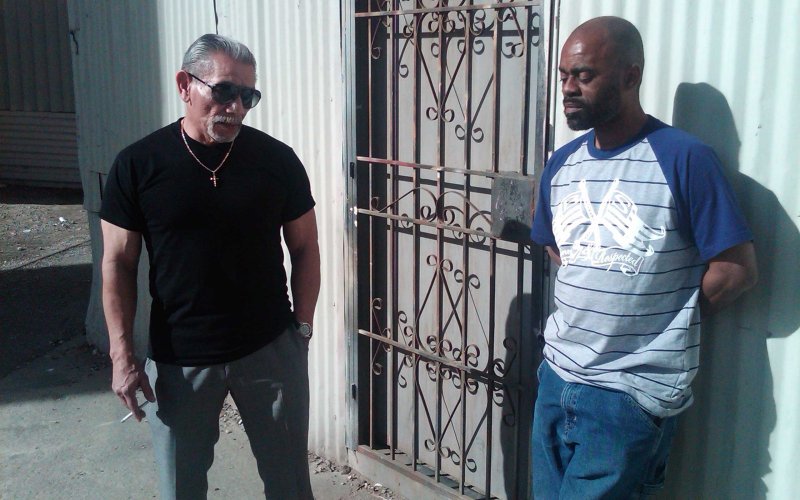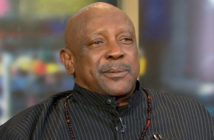This is the story of Freeway Rick Ross, the then anonymous drug kingpin of the eighties who was able to evade the police for a long time before being caught, sentenced and served close to 17 years in American prison.
Born Ricky Donnell Ross (January 26, 1960) Freeway Rick Ross is an American author and convicted drug trafficker best known for the drug empire he established in South Central, Los Angeles, California, in the early to mid 1980s.
He has at numerous occasions maintained that HipHop’s Rick Ross (real name William Leonard Roberts) stole his name and identity.
Marc Levin’s documentary Freeway: Crack in the System in March 2015 premiered on Al-Jazeera America. He wrote about Freeway Rick Ross’s connection to Selma and a generation of prisoners.
Freeway: Crack in the System has been invited by the Jubilee Film Festival to close next weekend’s historic events in Selma, Alabama. Now what does our documentary on the crack era and the man at its epicenter, Freeway Rick, have to do with this epic civil rights confrontation that galvanized the nation half a century ago?
The movie Selma, and Common and John Legend’s mesmerizing Oscar night performance of “Glory,” provide the answer. “Selma is now,” Legend said, explaining, “We live in the most incarcerated country in the world.” The mass incarceration of so many men of color is The New Jim Crow, the title of Michelle Alexander’s groundbreaking book. As she says in the film: “What explains the sudden explosion in incarceration, if not crime and crime rates? Well the answer is the War on Drugs and the Get Tough Movement.”
How did we get from the glorious battles of the Civil Rights Movement to the devastation of the crack plague? From the police crackdown on the marchers on the Selma bridge to the police killings of Michael Brown and Eric Garner? From the nonviolence movement of courageous civil rights activists to the gang violence that has made homicide the number one cause of death for young black men? And finally from the impassioned eloquence of Dr. King’s “I have a dream” to the drug kingpin’s “I have a life sentence?”
HipHop Rick Ross stole my name and my identity, he’s been living a fraud and he never sold drugs but was a correctional officer, he’s not me – he is not Rick Ross – They would never give me a job to be a correctional officer I guaranty you.
The Drug War’s Dirty Past
The drug war is over 40 years old, but during the Crack Era of the 1980’s, it was kicked into overdrive.
The stage was set by a changing global economy that moved traditional industry and jobs from American cities to underdeveloped countries. The Reagan administration escalated urban plight by cutting back social service programs and job training, while at the same time privatizing many public services, including prisons. Building prisons and keeping them full became big business.
Then drop tons of low-cost, high-quality white powder into the mix and—boom—the underground economy explodes. Rick and the Freeway Boys originally called their cocaine product “Ready Rock.” They thought they could take Hollywood’s luxury high and bring it crosstown to the hood.
Little did they imagine the consequences. Once the drug’s damaging effects were known, media hysteria broke out.
In 1986, President Reagan signed a law that made possession of 5 grams of crack the same as 500 grams of powder cocaine. Mandatory minimums were compounded in the 90s by the introduction of three-strike laws, adding decades to the sentences of repeat offenders.
So began the mass incarceration of a generation of young men of color. Since 1980, the number of people behind bars for drugs has grown from 41,000 to over half a million. Despite supposed equal treatment under the law, African Americans are sent to prison for drug offenses at 10 times the rate of whites.
Incarceration and prohibition proved to be a disastrous combination. Thousands of low-level street dealers and drug addicts were sentenced to years in prison. The Freeway Boys deployed the local Bloods and Crips to distribute the drugs, and they quickly expanded into national gangs. Military-grade weapons in criminal hands escalated the violence, turning the police into an occupying army in many inner-city neighborhoods. Lack of department funds and big-money busts exposed officers to harsh ethical dilemmas. Some became dirty cops, like Roberto Juarez, a top undercover for the L.A. sheriff’s department who testifies in our documentary: “We had gone from being cops to being crooks.”
Meanwhile the Reagan administration was preaching to the young “Just Say NO” to drugs and at the same time claiming “we just don’t know” about the drug dealing of our anti-communist allies.
This is the story that rocked black America and led to all sorts of conspiracy theories and urban legends. It is also the story that goes to the fundamental hypocrisy and corruption of this failed War on Drugs.
I first heard “CIA equals Crack In America” around the time of the Iran-Contra hearings in 1986, which I was covering as a young producer. But it was the Pulitzer Prize-winning journalist Gary Webb who blew the story open with “Dark Alliance,” his 1996 series for the San Jose Mercury News. Webb put a spotlight on the CIA and the Reagan Administration’s unholy alliance with anti-communist guerrillas and their supporters who were involved in drug trafficking. He uncovered how tons of cocaine were shipped into San Francisco by supporters of the CIA-backed Contras and then distributed down to L.A. to a Nicaraguan named Danilo Blandón who sold it to a street dealer from South Central: Freeway Rick Ross.
This is the story that rocked black America and led to all sorts of conspiracy theories and urban legends. It is also the story that goes to the fundamental hypocrisy and corruption of this failed War on Drugs.
When I tracked down Blandón in Nicaragua, he said to me, “Gary Webb tried to find me, Congresswoman Maxine Waters tried to find me, Oliver Stone tried to find me. You found me.” Although he would not go on film, Blandón agreed that the War on Drugs was futile and a failure.
As Tommy McDonald of the Drug Policy Alliance says in the documentary, “Drugs are really bad, but the drug war is worse.”
Today we may finally be reaching a tipping point. The decriminalization and legalization of marijuana is gaining momentum. Just this week, Washington D.C. legalized small amounts of pot. In Congress, an unlikely alliance of right and left, Senators like Cory Booker and Rand Paul, are pushing for drug policy and criminal justice reform.
Freeway Rick Ross is now a free man after serving over 20 years in federal prison. Like over half of those incarcerated, Rick was illiterate until he was 28. He learned to read in prison and became a jailhouse lawyer, eventually winning an appeal to get his sentence reduced. Today his mission is to teach literacy—reading, writing, financial, and media—to those whom educators find the hardest to reach. He acknowledges the terrible damage crack created, especially in African American communities, and he is now trying to give back.
Like Freeway Rick’s journey, this nation’s path to equality and progress is no straight road—it is full of twists, turns, convolutions and contradictions. We have the first black president while the Supreme Court and conservatives try to roll back voting rights. We have the first black attorney general and at the same time police seem to be getting away with killing young blacks. But the biggest change and challenge is that in 1965 there was hope, especially amongst the young, that they could change America. Today, sadly for too many, there is a sense of hopelessness—especially for poor young African American males who see themselves trapped in a system where 1 in 3 are doomed to be entangled in the criminal justice system, and where the major cause of death is homicide.
At a recent screening of Selma at the Jacob Burns Film Center in Westchester, New York, a group of mostly African American high school students said they had little idea of this history and were in awe of what their forebears had sacrificed and accomplished for them. Toward the end, one youngster rose to say that he wanted to share his own “I have a dream” speech. He said that he dreamed of the day when he could go out of his house, into his neighborhood, and into other communities without the fear of getting shot or stabbed.
How do we inspire today’s youth and restore their ability to dream? They don’t seem to listen to the voices of the old lions of the Civil Rights Movement: Jesse Jackson, Andrew Young, or Congressman John Lewis (D-GA 5th District). But they sit mesmerized when the street legend and reformed crack kingpin speaks to them.
If Rick Ross can connect his crimes, his punishment, and his redemption with these young people and show them the futility of violence, the importance of education, discipline and hard work, and the power of literacy, then maybe he can be a bridge that also connects these kids to their grandparents’ struggle for civil rights a half-century ago.
Today the struggle is not simply about race—it’s class, economic inequality, the education gap, and the digital divide. In the civil rights era there were jobs and a worker didn’t need higher education to make a living. Today without an education you’re doomed. That is why Rick’s new mission is critical. If we’re going to prevent the oppression of a permanent underclass lost on our mean streets or locked up in our jails and prisons, it’s going to take people who’ve been there and found a way out.
Every generation has to fight its own battle and find its own Free Way.
This story was adopted from the Daily Beast




